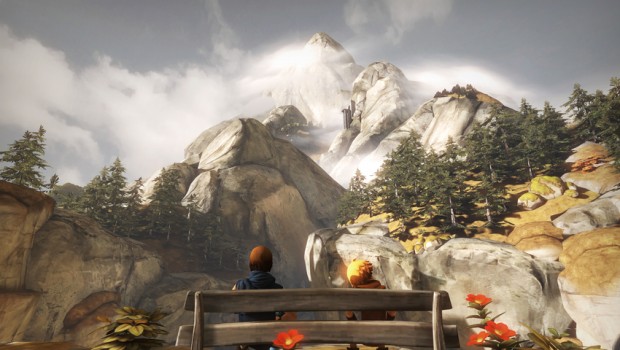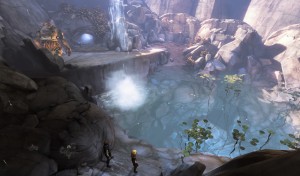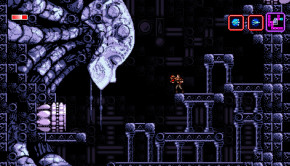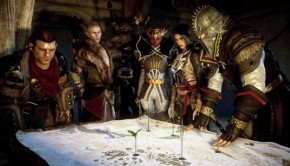Brothers: A Tale of Two Sons: Emotional Triggers
This article contains significant spoilers regarding the conclusion of Brothers: A Tale of Two Sons.
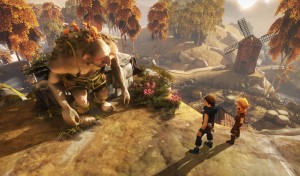 Howard Hawks famously described a great movie as “Three good scenes, no bad ones.” By that measure, Starbreeze Studios’ Brothers: A Tale of Two Sons falls slightly short of greatness; it has no truly bad scenes, but too much of the three-hour game is spent reheating the same gameplay tropes ICO gave us 10 years ago: running, jumping, climbing, crawling. It’s charming, but in the same way that Jim Henson’s The Storyteller is charming; good, not great, a diminished extension of a master’s better work. For some people, even a reflection of brilliance may be enough. But I was never able to fully love the game.
Howard Hawks famously described a great movie as “Three good scenes, no bad ones.” By that measure, Starbreeze Studios’ Brothers: A Tale of Two Sons falls slightly short of greatness; it has no truly bad scenes, but too much of the three-hour game is spent reheating the same gameplay tropes ICO gave us 10 years ago: running, jumping, climbing, crawling. It’s charming, but in the same way that Jim Henson’s The Storyteller is charming; good, not great, a diminished extension of a master’s better work. For some people, even a reflection of brilliance may be enough. But I was never able to fully love the game.
It has one great scene, however, and its power comes from the one particular aspect in which Brothers excels: its simple, unique, and ultimately emotional control scheme. It’s the controls that make Brothers memorable – not its its generic Euro-fantasy trappings, or its predictable narrative of two children on a quest to save their ailing father.
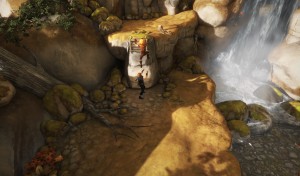 Brothers is a one-player co-operative adventure – a single player controls two brothers at once. The left analog stick and left trigger control the older brother; the right stick and right trigger, the younger. There are things only the older brother can do: swim across water, pull heavy levers, boost the younger brother to a higher ledge. There are things only the younger brother can do: crawl through fences, grab onto the older brother when he swims, be boosted by the older brother to a higher ledge.
Brothers is a one-player co-operative adventure – a single player controls two brothers at once. The left analog stick and left trigger control the older brother; the right stick and right trigger, the younger. There are things only the older brother can do: swim across water, pull heavy levers, boost the younger brother to a higher ledge. There are things only the younger brother can do: crawl through fences, grab onto the older brother when he swims, be boosted by the older brother to a higher ledge.
This is not an equal distribution of labor; already, the game is playing favorites. The older brother interacts with the environment and with his younger brother, he is an agent of change. The younger brother relies on his older brother to advance, he is a dependent. Controlling a character with your left hand comes as second-nature; but your right hand is usually used for camera control, weapons radials, or other less-demanding tasks. As a result, the older brother behaves as you’d expect a videogame protagonist to, while the right tends to lag behind, get caught on walls, or just be forgotten until he’s needed for something. Much like a younger brother.
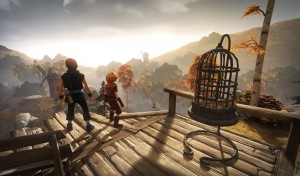 Most people struggle with controlling both characters at once until they happen upon the same simple trick: keep the left hand’s older brother on the left side of the screen, and the right hand’s younger brother on the right. Positioning the characters so that they match your hands allows you to cut the Gordian Knot of control confusion. It’s not just window dressing; when the characters “cross-over” during gameplay, your brain will frequently completely short circuit until you put them back in their place: older on the left, younger on the right. Left hand, right brain, right hand, left brain, three solid hours, wiring your brain to understand how Brothers is played. Then, of course, everything changes.
Most people struggle with controlling both characters at once until they happen upon the same simple trick: keep the left hand’s older brother on the left side of the screen, and the right hand’s younger brother on the right. Positioning the characters so that they match your hands allows you to cut the Gordian Knot of control confusion. It’s not just window dressing; when the characters “cross-over” during gameplay, your brain will frequently completely short circuit until you put them back in their place: older on the left, younger on the right. Left hand, right brain, right hand, left brain, three solid hours, wiring your brain to understand how Brothers is played. Then, of course, everything changes.
(Spoilers start here.)
At the very end of the game, things go terribly wrong and the older brother dies. It’s sudden and it’s brutish and it’s over. The younger brother is left alone to finish their quest by himself. Alone, he slowly buries his brother – right stick, right trigger. Alone, he slowly works his way back home; a bit more sure-footed, now that the player can give him her full attention, but dispirited. And then the younger brother reaches a storm-tossed lake he needs to cross and remembers that he can’t swim. His older brother was always the one who swam; he just hung on for dear life. But if he doesn’t cross the lake his father will die. What can he do? What can you do?
The younger brother LUNGES into the water, desperate, flailing. He hears a ghostly echo of his older brother’s voice. The camera tilts, he starts to drown…and then he makes it. He’s swimming, head above water. More crucially, he did something when you pressed the left trigger – the trigger that didn’t belong to him, but belonged to his older brother. This happens a few more times during his path home – he pulls a lever he couldn’t have before, he scales a high cliff where once he’d need a boost – but nothing matches that one first beautiful cathartic moment. Brothers’s sole raison d’être is to convince you, one time, to push the left trigger instead of the right one. And in that it succeeds admirably.
Why does this moment work so well? If the actions we take in games are verbs, then Brothers forces us to perform an act of translation – of inventing a new word that we hope will be understood. We are forced us to take a mental leap of faith beyond what we know will work into an area of high uncertainty. When it does work, the feeling of relief that washes over the player is much like the feeling of successfully communicating in a foreign language in a high-stress scenario. You made yourself understood! But in order to provide this moment, Brothers must limit the player to a “language” of only four words: two sticks, two triggers.
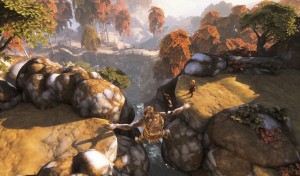 There’s even a possible neurological foundation for this “Eureka!” moment. Most of the brain’s language functions are handled in the perisylvian cortex of the left hemisphere. And for fully bilingual individuals, both Language 1 (L1) and Language 2 (L2) function primarily in the right hemisphere. However, non-fluent language learners are different – their primary L1 still activates the left hemisphere, while their secondary L2 triggers activity in the right hemisphere. “Translation” may not just be a metaphor – it may accurately describe what’s happening inside the player’s mind. Learning new words, like playing Brothers, requires tight co-operation between the left and right brain, so it’s hardly surprising Brothers’ biggest moment affects the player not just emotionally, but intellectually as well. By forcing the player to forge a new connection between what they’ve been thinking of as distinctly “right” and “left,” the game generates a feeling of not just joy and relief, but deep understanding.
There’s even a possible neurological foundation for this “Eureka!” moment. Most of the brain’s language functions are handled in the perisylvian cortex of the left hemisphere. And for fully bilingual individuals, both Language 1 (L1) and Language 2 (L2) function primarily in the right hemisphere. However, non-fluent language learners are different – their primary L1 still activates the left hemisphere, while their secondary L2 triggers activity in the right hemisphere. “Translation” may not just be a metaphor – it may accurately describe what’s happening inside the player’s mind. Learning new words, like playing Brothers, requires tight co-operation between the left and right brain, so it’s hardly surprising Brothers’ biggest moment affects the player not just emotionally, but intellectually as well. By forcing the player to forge a new connection between what they’ve been thinking of as distinctly “right” and “left,” the game generates a feeling of not just joy and relief, but deep understanding.
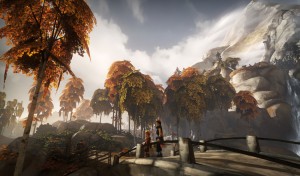 There’s no real doubt that games’ best emotional moments, the ones players really remember, are the ones that impact and change the way they play the game. Both ICO and Shadow of the Colossus take a perverse pleasure in denying the player core gameplay elements for heightened effect. When Papers, Please asked me to choose between improving my passport-stamping UI and buying medicine for my family, involving the game mechanics gave the decision additional weight. Personally, escaping the maze in Adam Cadre’s Photopia is the single greatest rush I’ve felt from a game – because I escaped my way. If writers need to “show, don’t tell,” then game designers need to “interact, don’t show.” No feeling is stronger than one players forge themselves.
There’s no real doubt that games’ best emotional moments, the ones players really remember, are the ones that impact and change the way they play the game. Both ICO and Shadow of the Colossus take a perverse pleasure in denying the player core gameplay elements for heightened effect. When Papers, Please asked me to choose between improving my passport-stamping UI and buying medicine for my family, involving the game mechanics gave the decision additional weight. Personally, escaping the maze in Adam Cadre’s Photopia is the single greatest rush I’ve felt from a game – because I escaped my way. If writers need to “show, don’t tell,” then game designers need to “interact, don’t show.” No feeling is stronger than one players forge themselves.

